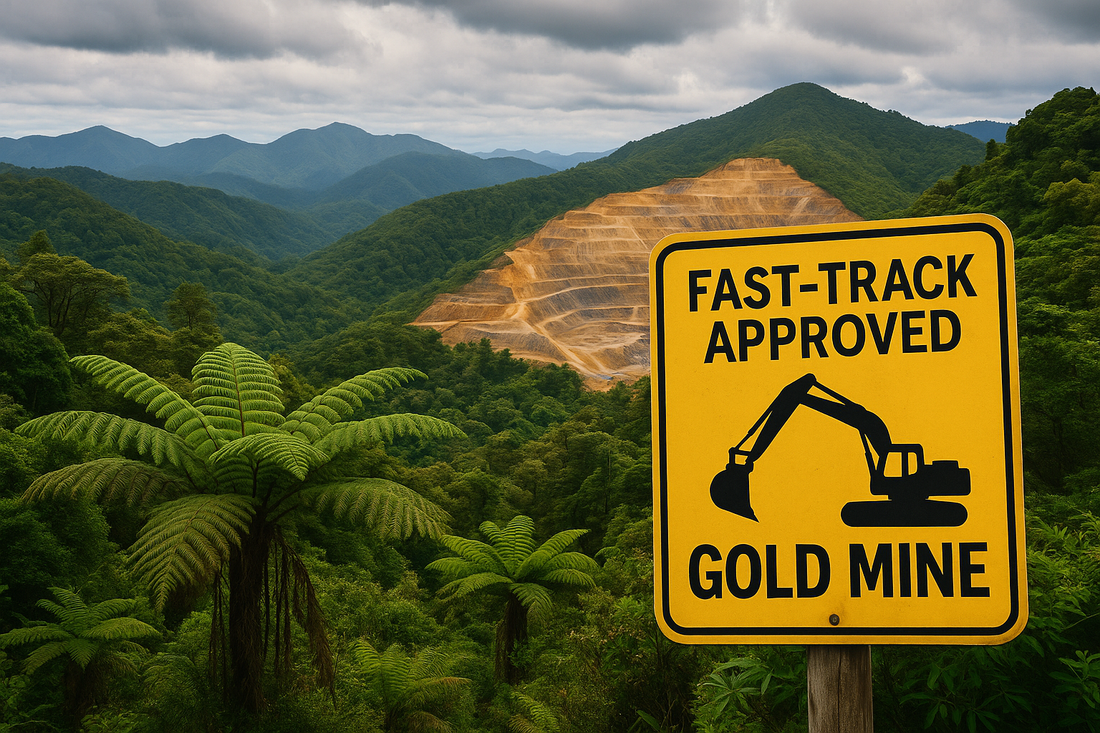
🛠️ Fast Isn’t Always Forward: What New Zealand’s Fast-Track Approval Law Means for Our Environment
In May 2025, the New Zealand government passed a sweeping fast-track approval law that has since ignited widespread debate. Marketed as a solution to sluggish infrastructure development, the law enables a wide range of construction, mining, and development projects to bypass long-standing environmental and iwi consultation processes.
But as fast as these approvals may be, many New Zealanders are asking: at what cost?
🌏 What Is the Fast-Track Approval Law?
This newly passed legislation grants a panel of three ministers—including the Environment and Infrastructure Ministers—the authority to push selected projects forward without going through full Resource Management Act (RMA) scrutiny, public consultation, or environmental impact assessments.
Over 150 projects are already lined up for fast-tracking. One of the most controversial: a proposed $5 billion gold mining operation in the protected Coromandel Forest Park, a sanctuary of native biodiversity.
🌿 Why This Matters to Every New Zealander
New Zealand isn’t just known for its stunning scenery—it’s recognized globally for its ecological heritage and leadership in sustainability. But that reputation, and the natural ecosystems it’s built on, are now under threat.
Here’s what’s at stake:
1. Biodiversity at Risk
New Zealand is home to more than 80,000 native species, many of which are found nowhere else in the world. Fast-tracked developments—especially in sensitive conservation areas—risk habitat destruction, invasive species spread, and even extinction for vulnerable species like the brown kiwi, Archey’s frog, and native bats.
2. Coromandel Forest Under Fire
The planned gold mine in Coromandel, a region long protected from industrial activity, sets a dangerous precedent. Mining in this area could lead to:
·Deforestation and land degradation
·Waterway contamination with heavy metals
·Long-term loss of carbon sinks crucial to fighting climate change
3. Erosion of Public Voice and Indigenous Rights
By cutting out iwi consultation and public submissions, the law weakens community participation and Treaty of Waitangi principles. For many Māori communities, this is seen not just as an environmental injustice, but a cultural one.
💡 Why Businesses and Consumers Should Pay Attention
Environmental policy isn’t just a political issue—it’s a business and lifestyle issue.
At Tiaki Life, we make biodegradable planters from rice hulls, offering New Zealanders an alternative to plastic that supports eco-friendly gardening, carbon reduction, and waste minimization.
But small, sustainable changes are not enough if larger-scale decisions are made at nature’s expense.
When conservation is side-stepped for convenience, everyone loses in the long term—businesses, communities, and the planet.
✅ What You Can Do: From Concern to Action
Whether you're a home gardener, policymaker, parent, or entrepreneur, you can help shape a more sustainable New Zealand:
✔️ Stay Informed
Follow updates on the Fast-Track Approvals Bill, especially projects planned near conservation or Māori land. Sign up for alerts from groups like Forest & Bird, Greenpeace NZ, and The Aotearoa Legal Action Network (ALAN).
✔️ Support Eco-Friendly Brands
When you support businesses that prioritize sustainable materials, you vote with your wallet. Choose products made from biodegradable, plastic-free, and renewable resources—like our Tiaki Life rice hull planters.
✔️ Speak Up
Write to your local MP. Join petitions. Talk about the issue on social media. Use hashtags like
#SaveCoromandel, #ProtectNZNature, and #SustainableAotearoa to amplify your voice.
🌱 A Final Thought from Tiaki Life
We don’t believe that progress has to come at nature’s expense. Instead, we ask:
What if fast-tracking approval meant fast-tracking climate solutions, clean energy, or biodiversity restoration?
At Tiaki Life, we stand for products and policies that protect, not exploit. That’s why we invite you to learn more, share this message, and join us in creating a greener, fairer Aotearoa.
